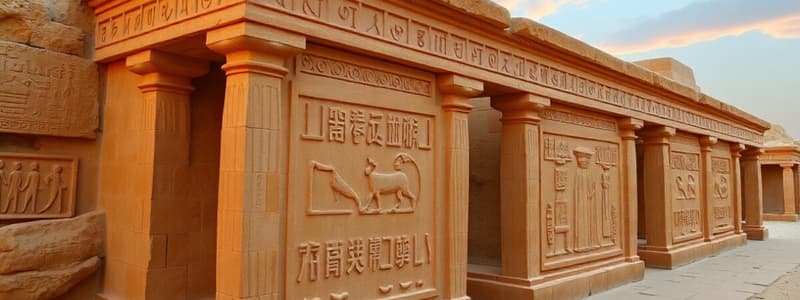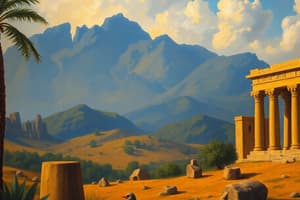Podcast
Questions and Answers
What geographical feature is central to the development of Mesopotamian civilization?
What geographical feature is central to the development of Mesopotamian civilization?
- Indus River
- Yellow River
- Tigris and Euphrates Rivers (correct)
- Nile River
Which of the following civilizations is known for its structure of government that introduced democracy?
Which of the following civilizations is known for its structure of government that introduced democracy?
- Ancient Greece (correct)
- Ancient Egypt
- Indus Valley Civilization
- Ancient Rome
What is one key contribution of the Ancient Egyptians to modern society?
What is one key contribution of the Ancient Egyptians to modern society?
- Advances in metallurgy
- Cuneiform writing system
- Development of the wheel
- Use of hieroglyphics (correct)
Which civilization is noted for its advanced urban planning with a grid layout?
Which civilization is noted for its advanced urban planning with a grid layout?
Which of the following is a major philosophical contribution from Ancient China?
Which of the following is a major philosophical contribution from Ancient China?
What significant engineering innovation is Ancient Rome known for?
What significant engineering innovation is Ancient Rome known for?
Which civilization is credited with the invention of papermaking?
Which civilization is credited with the invention of papermaking?
Which ancient African kingdom was known for its wealth and cultural center of learning?
Which ancient African kingdom was known for its wealth and cultural center of learning?
Flashcards are hidden until you start studying
Study Notes
Ancient Civilizations
1. Mesopotamia
- Known as the "Cradle of Civilization."
- Located between the Tigris and Euphrates rivers (modern-day Iraq).
- Notable cultures: Sumerians, Akkadians, Babylonians, Assyrians.
- Key Contributions:
- Cuneiform writing system.
- Code of Hammurabi (early legal system).
- Advances in mathematics and astronomy.
2. Ancient Egypt
- Located along the Nile River in Northeast Africa.
- Known for its pharaohs, pyramids, and hieroglyphics.
- Key Contributions:
- Development of a calendar based on the lunar and solar cycles.
- Medical advancements, including surgical techniques.
- Monumental architecture, such as the Great Pyramid of Giza.
3. Indus Valley Civilization
- Located in present-day Pakistan and northwest India.
- Key cities include Harappa and Mohenjo-Daro.
- Characteristics:
- Advanced urban planning with grid layout.
- Complex drainage system.
- Trade networks with Mesopotamia.
4. Ancient China
- Early dynasties include the Xia, Shang, and Zhou.
- Contributions:
- Invention of writing, gunpowder, and papermaking.
- Confucianism and Daoism as influential philosophies.
- Development of the Great Wall and Silk Road for trade.
5. Ancient Greece
- Birthplace of democracy, philosophy, and theater.
- Major city-states: Athens (democracy) and Sparta (military).
- Key Contributions:
- Philosophy (Socrates, Plato, Aristotle).
- Arts and architecture (Parthenon, sculpture).
- Olympic Games initiation.
6. Ancient Rome
- Started as a city-state, expanded into a vast empire.
- Key Contributions:
- Engineering innovations (aqueducts, roads).
- Roman law and governance systems.
- Latin language influence on many modern languages.
7. Mesoamerican Civilizations
- Civilizations such as the Mayans and Aztecs.
- Key Contributions:
- Maya: advanced calendar system, hieroglyphic writing.
- Aztec: complex society with large urban centers like Tenochtitlán.
- Agriculture: maize, beans, and cocoa cultivation.
8. Ancient Africa
- Kingdoms like Ghana, Mali, and Songhai known for trade and wealth.
- Contributions:
- Timbuktu as a center of learning and culture.
- Rich oral traditions and storytelling.
- Development of agriculture and trade networks across the Sahara.
Conclusion
- Ancient civilizations laid the foundation for modern societies through innovations in governance, culture, architecture, writing, and trade. Each civilization contributed uniquely to human history and development.
Mesopotamia
- Located in modern-day Iraq between the Tigris and Euphrates rivers
- Known for its advancements in writing, law, and mathematics
- Major cultures include Sumerians, Akkadians, Babylonians, and Assyrians
- Notable contributions:
- Cuneiform writing system
- Code of Hammurabi (early legal code)
- Advances in mathematics and astronomy
Ancient Egypt
- Located along the Nile River in Northeast Africa
- Known for its pharaohs, pyramids, and hieroglyphics
- Contributions:
- Development of a calendar based on the lunar and solar cycles
- Medical advancements, including surgical techniques
- Monumental architecture, such as the Great Pyramid of Giza
Indus Valley Civilization
- Located in present-day Pakistan and northwest India
- Key cities include Harappa and Mohenjo-Daro
- Characteristics:
- Advanced urban planning with grid layout
- Complex drainage system
- Trade networks with Mesopotamia
Ancient China
- Early dynasties include the Xia, Shang, and Zhou
- Contributions:
- Invention of writing, gunpowder, and papermaking
- Confucianism and Daoism as influential philosophies
- Development of the Great Wall and the Silk Road for trade
Ancient Greece
- Birthplace of democracy, philosophy, and theater
- Major city-states: Athens (democracy) and Sparta (military)
- Contributions.:
- Philosophy (Socrates, Plato, Aristotle)
- Arts and architecture (Parthenon, sculpture)
- Initiation of Olympic Games
Ancient Rome
- Started as a city-state, expanded into a vast empire
- Contributions:
- Engineering innovations (aqueducts, roads)
- Roman law and governance systems
- Latin language influence on many modern languages
Mesoamerican Civilizations
- Civilizations such as the Mayans and the Aztecs
- Contributions:
- Maya: advanced calendar system, hieroglyphic writing
- Aztec: complex society with large urban centers like Tenochtitlán
- Agriculture: maize, beans, and cocoa cultivation
Ancient Africa
- Kingdoms like Ghana, Mali, and Songhai known for trade and wealth
- Contributions:
- Timbuktu as a center of learning and culture
- Rich oral traditions and storytelling
- Development of agriculture and trade across the Sahara
Studying That Suits You
Use AI to generate personalized quizzes and flashcards to suit your learning preferences.




